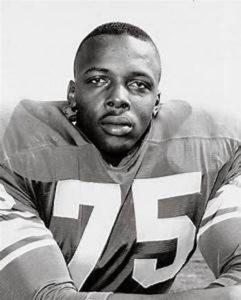
Deacon Jones
*Deacon Jones was born on this date in 1938. He was a Black football player, actor, and philanthropist.
David D. "Deacon" Jones was born in Eatonville, Florida, and lived in a four-bedroom house with his family of ten. Jones attended Hungerford High School, where he played football, baseball, and basketball. His college football career consisted of a year at South Carolina State University in 1957, followed by a year of inactivity in 1958. South Carolina State revoked Jones' scholarship after they learned he was a part of the 20th-century American Civil Rights movement.
However, one of the assistant football coaches at South Carolina State was leaving to coach at Mississippi Vocational and told Jones and some other Black players that he could get them scholarships at the new school. While playing at Mississippi Vocational, he and his Black teammates had to sleep in cots in the opposing team's gym because motels wouldn’t take them on numerous occasions. Jones played a final season at Mississippi Vocational College in 1960.
The Los Angeles Rams drafted Jones in the fourteenth round of the 1961 NFL Draft. He then earned a starting role as a defensive end and teamed with tackle Merlin Olsen to give Los Angeles an All-Pro left side of the defensive line. He became a part of the Rams' Fearsome Foursome defensive line (along with Lamar Lundy, Roosevelt Grier, and Olsen), considered one of the best defensive lines ever.
Jones won consensus All-Pro honors five straight years from 1965 through 1969 and was Second-team All-Pro in 1964, 1970, and 1972. He was also in seven straight Pro Bowls, from 1964 to 1970, and was selected to eighth after the 1972 season with the San Diego Chargers. He was voted the team's Outstanding Defensive Lineman by the Los Angeles Rams Alumni in 1962, 64, 65, and 66.
In 1971, Jones suffered a severely sprained arch, which caused him to miss four starts, and he ended the season with 4½ sacks, his career-low. In 1972, Jones was included in a multi-player trade with the San Diego Chargers, where he was an instant success. He was named San Diego's defensive captain, led all Chargers' defensive linemen in tackles, and won a berth on the AFC Pro Bowl squad. He concluded his career with the Washington Redskins in 1974. Along the way, Jones was named the Associated Press NFL Defensive Player of the Week four times. An extremely durable player, Jones missed only six games of a possible 196 regular-season encounters in his 14 National Football League seasons.
Deacon Jones was married to his wife, Elizabeth, the chief operating and financial officer of the Deacon Jones Foundation. He lived in Anaheim Hills, California. Jones was a rhythm and blues singer during his football days and was backed by the band Nightshift, which later became the group War. Jones was featured in "Why Can't We Be Friends," which he recorded with War. Jones performed on "The Hollywood Palace" in 1967 and 1968 and on the Merv Griffin Show in 1970.

He worked as a television actor and has appeared in numerous TV programs since the 1970s, often in cameo roles. In an episode of The Odd Couple, he and Oscar were in a television commercial selling shaving products. He appeared on The Brady Bunch, and in a Bewitched episode in 1969, he played a guard at the Giant's castle in Jack and the Beanstalk. Jones also played himself on an episode of Wonder Woman in 1978.
In 1978, he played a Viking named 'Thall' in The Norseman. Fellow Hall of Famer Fred Biletnikoff joined Jones in that film, also portraying a Norseman. That same year, Jones portrayed a fierce defensive lineman named 'Gorman' in Heaven Can Wait. In the series G v. E, he played himself as an agent of "The Corps." He also played a role in the hit show ALF, where he played a father figure to Alf. He was a color analyst for Rams broadcasts on KMPC radio in the 1994 season, teaming with Steve Physioc and Jack Snow.
Jones also worked for many companies, including the Miller Brewing Company, Haggar Clothing, Pacific Coast Medical Enterprises, and Epson America, and represented the NFL and Champion Products as spokesman for their Throwback campaigns. He was also chairman of AstraZeneca Pharmaceuticals in their national hypertension awareness program.
Since 9/11, Jones made several trips to Iraq to meet with troops. He has also served as the president and CEO of the Deacon Jones Foundation, an organization he founded in 1997 "to assist young people and the communities in which they live with a comprehensive program that includes education, mentoring, corporate internship, and community service."
He was elected to the Pro Football Hall of Fame in his first year of eligibility in 1980 and was named to the NFL's 75th Anniversary All-Time Team in 1994. In 1999, he was ranked 13 on The Sporting News list of the 100 Greatest Football Players, the highest-ranked defensive end. The same year, he was named by Sports Illustrated as the "Defensive End of the Century." Deacon Jones died on June 3, 2013, of natural causes at his Anaheim Hills, California, home. He was 74.